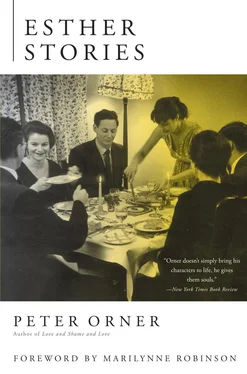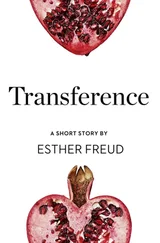In the shop, pressing her handbag and the shirt to her chest, listening to the manic click of the machine, watching Melba’s head. Maybe Sarah will tell her again (she wrote her about it after, in a flurry, and sent the letter to one of the many addresses she had for Melba then) about her own escape from Fall River. She’s sure Melba’s forgotten, if the letter even made it to her. And of course it was only for a weekend, but there was Sarah Gottlieb’s famous eloping to Rhode Island. People still talk about how Rhoda was born big and healthy barely seven scandalous months later, and how her mother’s rage lasted till the day she died. Didn’t Sarah take her risk, too? She never thought it would matter again (she was just like so many other people now), but now her once running means more.
She clears her throat. “Melba dear, I thought I’d drop by and bring you—”
Melba swivels her stool. Slivery wrinkles below her eyes like veins in a leaf the only change. It could be 1936. They could be on the shore of Watuppa talking about Howie or Hughie, the one from Boston who chased Melba for months, one of the many she didn’t choose, the one who kept circling her block in his convertible, hundreds of times a day. They called them Howie’s laps, and they became as much a part of the neighborhood as Mrs. Gilda Rubover’s garden of rabbit skeletons.
Yes, the same as ever, but tired now, too. Maybe it’s the sallow light of the store, but there’s exhaustion in that still-beautiful face. Melba’s eyes linger before she welcomes Sarah with her old closed-mouthed smirk. It’s in the way the sweat’s pooled in the notch of her upper lip, a glimpse of what’s disappeared in that trickle of moment before Melba calls, sprightly, over the noise of the machine, “Ah, Sarah.”
And Sarah looks at her and thinks, We’re becoming older women, on the verge of turning into those fat-ankled waddlers at the club, the ones that Walt says keep disappearing into their shoes. Even you.
Melba waves her closer. “Sit! Sit!” The shop is cluttered and stuffy. Fabric is stacked in piles on the floor. Skirts clipped on hangers are draped over ironing boards. Measuring tape’s in a heap. There are books on a shelf alongside a pile of sewing magazines. There’s a bowl of chocolate and a ripped calendar. A cat. Even you, Melba. You can’t hide behind not caring.
Melba tosses a pincushion away, wipes off a wooden school chair with a rag. “Sit! Sit! For God’s sake, sit down, Sarah.” She sighs. “So good to see you. Too too long. I haven’t laid eyes on you in weeks, ages, honey.”
Sarah sits on the edge of the chair to make clear she can’t stay long, that she’s only pausing for a quick chat. She tells about the shirt, what a klutz Walt is, how he insists on wearing his good clothes around the house to fix things that don’t need fixing. Yet even as she rambles on, she becomes aware of something in the way Melba said “weeks, ages.” As if they aren’t different. As if they could just as easily be the same, for all she needs or cares. And then Sarah knows, all at once, what should have been the obvious truth all along: that the marriage was short-lived, that the husband probably didn’t last a year or two after that shirtless picture by the tree, that it was Melba who did all the moving around, that she’d been alone, that she’d been a seamstress for the last twenty-odd years, a damn good one, and that she came home for the same reason everybody comes home, but that in her case it wasn’t to chase her past; she merely wanted to live near it. That proximity itself was comfort.
That she’d been alone, probably many years alone, maybe even because she wanted to be. Sarah thinks of Walt, how often during the day she forgets all about him, but still he arrives every afternoon, breathing heavy at the back stoop, arms full of more junk they’d never need; he arrives, always, some afternoons knocking on the door with his head because he’s got no free hand. And yes, she feels pity, but Sarah’s first instinct is to rub Melba’s unchanged face in everything she doesn’t have, to unbuckle her handbag and wave pictures of Rhoda. Rhoda’s report cards, her hundred boyfriends, her Honor Society pins, her still-life drawings of fruit and vegetables…
They make small talk about the shop and some things Melba’s working on. She’s doing Nina Shetzer’s daughter’s wedding party. (An absolutely horrid plum! The bridesmaids are going to look like the walking wounded.) But after a couple of awkward, too-long silences, Sarah can’t keep herself from blurting, “I hate myself for saying this, Melba, but the girls all talk about your life like it’s a train wreck.”
Melba laughs and swoops her arm in an arc to damn them all, every last one of them, to hell. And what’s incredible is that even her voice is the same, thick and direct like a man’s, like the rocks she used to fling into the Watuppa. “Tell them I was never a whore. Tell those yappies that.”
Sarah doesn’t nod, only stares back at her and seeks forgiveness from Melba’s eyes for the curse of being no better than everybody else, for reveling in such a miraculous and perfect failure. She thinks of the early postcards, the black-and-white photographs, Melba’s zigzagged scrawl: Darling Sarah, We’ve moved to a place called Wabash in Indiana. We live in a house on a small hill overlooking a dirty rushing river. Reminds me a bit of home, but the rivers are so much smaller here. Please write! I don’t know two souls here. Your M
“Not one of them ever once called you that. Not one.”
But Melba’s still laughing at the thought and doesn’t care if they did or they didn’t. She scoots her stool closer, leans, and squeezes Sarah’s wrists. Her palms are hot and wet from work.
AND THEIR DAUGHTER married Arthur Mendlebaum. The wedding was at Beth El in Fall River, and Walt and Sarah Kaplan were dressed to the nines, beaming. Sarah directing traffic, Walt telling jokes he either read in a book or stole from Alf Dolinsky. Rhoda one enormous smile in white — though to Sarah’s horror she’d pinned up her train at the last moment. Arthur’s family, cranky rich Rhode Islanders who looked down their noses at Fall River, at the musty temple, at the murmuring rabbi in his soup-stained jacket. At the Kaplan relatives and their Russian accents, at Walt’s made-up Yiddish that was really pigeon Portuguese he’d picked up from stock boys at his store. But Arthur himself was a peach, a good old boy who could pal around with Walt until Walt exhausted himself with stories. Sarah said Walt loved Arthur more than Rhoda, if only because Arthur was the first person in Fall River history who’d never once yawned in his face, said she’d be happy if they’d have him down to New York to take the load off her ears once in a while. Of course, this was bull; at home, with nobody around, it was Sarah’s yap that drilled his ears and Walt who’d hunker in his study with his maps and atlases. But talk is talk at a wedding, and Walt said, “Anytime I’m invited I’ll come down there and bore Arthur to so many tears he’ll sleep in his office to escape me.” And Arthur said, “For God’s sake, Walt, you’re the least dullest guy from here to Worcester” (pronouncing it Worster), and everybody yucked as if he was the next greatest Jewish comic. Sarah laughed loudest, her patented guffaw, her whale honk. Arthur was taller than any Jew she’d ever known, much less been related to. He laughed because he liked to laugh. He pinched Rhoda when he thought nobody was looking. He looked at other girls when he thought nobody was looking. He was a healthy strapper who was going to be rich! Didn’t everybody know he had a job working on the Stock Exchange in New York? Rich, rich, rich, rich, rich. Arthur is going to be rich and Rhoda is going to have babies and speak French to them. Why Rhoda went around speaking that French, Sarah had not an iota of an idea (though it was true that she often told her friends, “Well, you know, Rhoda is truly a genius at the French language”). All she really knew was that her daughter was going to have a house in the suburbs of New York, a real house with more than two trees and more than one bathroom. In a place called Rye Bread, Walt insisted on calling it. My daughter is leaving a city named after the mighty confluence of two rivers for a place named after a sandwich. But Rhoda said no, it was only called Rye. Rye, New York. A place with shaggy trees, wide boulevards, no dead mills (our rat hotels, Walt calls them) — a place with no jobs, only houses and trains. Trains to take men in hats to work in the city and trains to take them home.
Читать дальше












